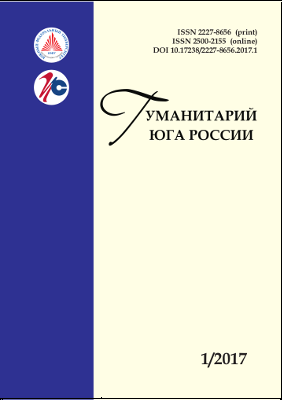Понятие «региональная идентичность» в зарубежном научном дискурсе
Для цитирования
Малащенко М. В., Глушкова С. А. Понятие «региональная идентичность» в зарубежном научном дискурсе // Гуманитарий Юга России. 2017. Том 23. № 1. С. 90-100.
Аннотация
В статье отмечается, что методологические трудности, связанные с изучением региональных идентичностей, заключаются в том, что в современных научно-исследовательских практиках понятия «идентичность» и «регион» употребляются в различных значениях. В рамках лингвопрагматического анализа рассматриваются разные варианты интерпретации этих понятий в зарубежном научном дискурсе и раскрываются эвристические возможности их использования в научных исследованиях.
Ключевые слова:
идентичность, регион, региональная идентичность, дискурс, лингвопрагматический анализ
Литература
Allen J. Lost Geograpies of Power. Oxford, 2003. P. 230–243.
Brubaker R., Cooper F. Beyond “identity” // Theory and Society 29. Netherlands, 2000. 47 р.
Martin D.-C. The choices of identity // Social identities. Basingstoke. 1995. Vol. 1, No 1. P. 5.
Meijers E., Romein A. Realizing potential: building regional organizing capacity in polycentric urban regions // European Urban and Regional Studies. 2003. P. 173–186.
Paasi A. The region, identity and power // Regional Environmental Governance: Interdisciplinary Perspectives, Theoretical Issues, Comparative Designs (REGov). 2011. Vol. 14. Р. 9–16.
Paasi A. The resurgence of the “region” and “regional identity”: theoretical perspectives and empirical observations on the regional dynamics in Europe // Review of International Studies. 2009. P. 121–146.
Paasi A. Regions are social constructs, but who or what constructs them? Agency in question // Environment and Planning. 2010. P. 2296–2301.
Paasi A. From region to space II // The Wiley-Blackwell Companion to Human Geography / J. A. Agnew & J. S. Duncan (Eds.). Oxford, 2011. P. 161–175.
Raco M. Building new subjectivities: devolution, regional identities and the re-scaling of politics // Territory, Identity and Spatial Planning / M. Tewdwr-Jones & P. Allmendinger (Eds.). London, 2006. P. 320–334.
Semian M., Chromy P. Regional identity as a driver or a barrier in the process of regional development: a comparison of selected European experience // Norwegian journal of geography. 2014. Vol. 68, No 5. P. 263–270.
Söderbaum F. Introduction: theories of new regionalism // Theories of New Regionalism / F. Söderbaum & T. Shaw (Eds.). London, 2003. P. 1–23.
Stets J.E., Burke P.J. Gender, Control, and Interaction // Social Psychology Quarterly. 1996. P. 185–217.
Глушкова С.А., Малащенко М.В. The Concepts of Identity and Region: Convergence or Divergence // Актуальные проблемы моделирования, проектирования и прогнозирования социальных и политических процессов в мультикультуральном пространстве современного общества : материалы V Междунар. науч. конф. молодых ученых. Ростов н/Д., 2016. С. 388–393.
Лубский А.В. Дискурсы о национальной и цивилизационной идентичностях в России // Научная мысль Кавказа. 2014. № 2. С. 24–32.
Лубский А.В. Идентичность: методологические проблемы дискурсивных практик // Социально-гуманитарные знания. 2013. № 11. С. 96–103.
Лубский А.В., Лубский Р.А. Этатизм и патернализм как культурные маркеры цивилизационной идентичности в России // Гуманитарий Юга России. 2013. № 3. С. 90–103.
Малащенко М.В. Имя в парадигмах лингвопрагматики. Ростов н/Д., 2003. 312 с.
Миненков Г.Я. Политика идентичности с точки зрения современной социальной теории // Политическая наука: Идентичность как фактор политики и предмет политической науки. М., 2005. № 3.
Brubaker R., Cooper F. Beyond “identity” // Theory and Society 29. Netherlands, 2000. 47 р.
Martin D.-C. The choices of identity // Social identities. Basingstoke. 1995. Vol. 1, No 1. P. 5.
Meijers E., Romein A. Realizing potential: building regional organizing capacity in polycentric urban regions // European Urban and Regional Studies. 2003. P. 173–186.
Paasi A. The region, identity and power // Regional Environmental Governance: Interdisciplinary Perspectives, Theoretical Issues, Comparative Designs (REGov). 2011. Vol. 14. Р. 9–16.
Paasi A. The resurgence of the “region” and “regional identity”: theoretical perspectives and empirical observations on the regional dynamics in Europe // Review of International Studies. 2009. P. 121–146.
Paasi A. Regions are social constructs, but who or what constructs them? Agency in question // Environment and Planning. 2010. P. 2296–2301.
Paasi A. From region to space II // The Wiley-Blackwell Companion to Human Geography / J. A. Agnew & J. S. Duncan (Eds.). Oxford, 2011. P. 161–175.
Raco M. Building new subjectivities: devolution, regional identities and the re-scaling of politics // Territory, Identity and Spatial Planning / M. Tewdwr-Jones & P. Allmendinger (Eds.). London, 2006. P. 320–334.
Semian M., Chromy P. Regional identity as a driver or a barrier in the process of regional development: a comparison of selected European experience // Norwegian journal of geography. 2014. Vol. 68, No 5. P. 263–270.
Söderbaum F. Introduction: theories of new regionalism // Theories of New Regionalism / F. Söderbaum & T. Shaw (Eds.). London, 2003. P. 1–23.
Stets J.E., Burke P.J. Gender, Control, and Interaction // Social Psychology Quarterly. 1996. P. 185–217.
Глушкова С.А., Малащенко М.В. The Concepts of Identity and Region: Convergence or Divergence // Актуальные проблемы моделирования, проектирования и прогнозирования социальных и политических процессов в мультикультуральном пространстве современного общества : материалы V Междунар. науч. конф. молодых ученых. Ростов н/Д., 2016. С. 388–393.
Лубский А.В. Дискурсы о национальной и цивилизационной идентичностях в России // Научная мысль Кавказа. 2014. № 2. С. 24–32.
Лубский А.В. Идентичность: методологические проблемы дискурсивных практик // Социально-гуманитарные знания. 2013. № 11. С. 96–103.
Лубский А.В., Лубский Р.А. Этатизм и патернализм как культурные маркеры цивилизационной идентичности в России // Гуманитарий Юга России. 2013. № 3. С. 90–103.
Малащенко М.В. Имя в парадигмах лингвопрагматики. Ростов н/Д., 2003. 312 с.
Миненков Г.Я. Политика идентичности с точки зрения современной социальной теории // Политическая наука: Идентичность как фактор политики и предмет политической науки. М., 2005. № 3.
Форматы цитирования
Другие форматы цитирования:
APA
Малащенко, М. В., & Глушкова, С. А. (2017). Понятие «региональная идентичность» в зарубежном научном дискурсе. Гуманитарий Юга России, 23(1), 90-100. извлечено от https://www.jour.fnisc.ru/index.php/hsr/article/view/4969
Раздел
СОЦИАЛЬНАЯ СТРУКТУРА И СОЦИАЛЬНЫЕ ИНСТИТУТЫ В СОВРЕМЕННОМ ОБЩЕСТВЕ






